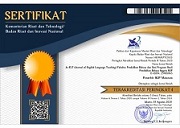The Students’ Perception of the Teacher’s Facilitation in Online Group Work
Abstract
This research examines the students’ perception of the teacher’s facilitation in online group work in English for Managers class at the Faculty of Business and Economics, Universitas Atma Jaya Yogyakarta. The study employed The Community of Inquiry (CoI) framework perspective, which consists of teaching presence, cognitive presence, and social presence. CoI has been widely employed in designing practical online courses. Thus, this descriptive qualitative research analyzed students’ perceptions of facilitation in online group work using questionnaires and interviews. The research participants were English for Managers students. They were selected since they have experience participating in online group work. The results of the study show that most of the participants have demonstrated to possess a positive perception of the teacher’s facilitation in online group work in EFM class at FBE UAJY.
Keywords
Full Text:
PDFReferences
Brindley, J. E., Blaschke, L. M., & Walti, C. (2009). Creating Effective Collaborative Learning Groups in an Online Environment Creating Effective Collaborative Learning Groups in an Online Environment Introduction : The Challenge of Creating. International Review of Research in Open and Distributed Learning, 10(3), 1–18. https://doi.org/10.19173/irrodl.v10i3.675
Curtis, D. D., & Lawson, M. J. (2001). Exploring collaborative online learning. Journal of Asynchronous Learning Network, 5(1). https://doi.org/10.24059/olj.v5i1.1885
Edy, D. L., Widiyanti, W., & Basuki, B. (2020). Revisiting the impact of project-based learning on online learning in vocational education: Analysis of learning in pandemic covid-19. 4th International Conference on Vocational Education and Training, ICOVET 2020, 264–267. https://doi.org/10.1109/ICOVET50258.2020.9229921
Gamage, K. A. A., de Silva, E. K., & Gunawardhana, N. (2020). Online delivery and assessment during COVID-19: Safeguarding academic integrity. Education Sciences, 10(11), 1–24. https://doi.org/10.3390/educsci10110301
Garrison, D. R., Cleveland-Innes, M., & Fung, T. S. (2010). Exploring causal relationships among teaching, cognitive and social presence: Student perceptions of the community of inquiry framework. Internet and Higher Education, 13(1–2), 31–36. https://doi.org/10.1016/j.iheduc.2009.10.002
Garrison, D. Randy, & Arbaugh, J. B. (2007). Researching the community of inquiry framework: Review, issues, and future directions. Internet and Higher Education, 10(3), 157–172. https://doi.org/10.1016/j.iheduc.2007.04.001
Goldstone, R. L., & Barsalou, L. W. (1998). Reuniting perception and conception. Cognition, 65(2–3), 231–262. https://doi.org/10.1016/S0010-0277(97)00047-4
Goldstone, R. L., Landy, D. H., & Son, J. Y. (2010). The education of perception. Topics in Cognitive Science, 2(2), 265–284. https://doi.org/10.1111/j.1756-8765.2009.01055.x
González Ramírez, C. (2015). English for Specific Purposes: Brief History and Definitions. Revista de Lenguas Modernas, 23, 1–6. https://doi.org/10.15517/rlm.v0i23.22359
Huizinga, T., Lohuis, A., Zwerver-Bergman, J., & van der Meer, R. (2022). Student and teacher perceptions of community of inquiry in hybrid virtual classrooms. Heliyon, 8(12), e12549. https://doi.org/10.1016/j.heliyon.2022.e12549
Johns, A. M. (2013). The History of English for Specific Purposes Research. In B. Paltridge & S. Starfield (Eds.), The Handbook of English for Specific Purposes (pp. 1–54). Wiley-Blackwell. https://doi.org/10.1002/9781118339855.ch16
Jones, S. R., Torres, V., & Arminio, J. (2021). Designing a Qualitative Study. Negotiating the Complexities of Qualitative Research in Higher Education, 65–91. https://doi.org/10.4324/9781003090694-3
Jordaan, T., & Havenga, M. (2021). The show must go on: Active online collaboration during COVID-19 – Mathematics students solving real-world problems. International Symposium on Project Approaches in Engineering Education, 11, 49–56. https://doi.org/10.5281/zenodo.5095292
Kaczkó, É., & Ostendorf, A. (2022). Critical thinking in the community of inquiry framework: An analysis of the theoretical model and cognitive presence coding schemes. Computers & Education, 193(November 2022), 104662. https://doi.org/10.1016/j.compedu.2022.104662
Khan, M. A., Vivek, Nabi, M. K., Khojah, M., & Tahir, M. (2021). Students’ perception towards e-learning during covid-19 pandemic in India: An empirical study. Sustainability (Switzerland), 13(1), 1–14. https://doi.org/10.3390/su13010057
Lachner, A., Hoogerheide, V., van Gog, T., & Renkl, A. (2022). Learning-by-Teaching Without Audience Presence or Interaction: When and Why Does it Work?. Educational Psychology Review, 34(2). Springer US. https://doi.org/10.1007/s10648-021-09643-4
Mohammad, A., Al-iessa, A. H. K. A., & Afrouz, M. (2023). Relationship between Iraqi EFL Students’ Perceptions of Community of Inquiry and their Attention and Engagement. Online Classes, 17(1), 227–255. https://doi.org/https://doi.org/10.22132/TEL.2022.164264
Nassaji, H. (2015). Qualitative and descriptive research: Data type versus data analysis. Language Teaching Research, 19(2), 129–132. https://doi.org/10.1177/1362168815572747
Qiong, O. U. (2017). A Brief Introduction to Perception. Studies in Literature and Language, 15(4), 18–28. https://doi.org/10.3968/10055
Ribosa, J., & Duran, D. (2022a). Do students learn what they teach when generating teaching materials for others? A meta-analysis through the lens of learning by teaching. Educational Research Review, 37, 100475. https://doi.org/10.1016/j.edurev.2022.100475
Roberts, T. S. (2004). Online Collaborative Learning Theory and Practice Related papers (M. Khosrow-Pour & J. Travers (eds.). Information Science Publishing.
Rojabi, A. R. (2020). Exploring EFL Students’ Perception of Online Learning via Microsoft Teams: University Level in Indonesia. English Language Teaching Educational Journal, 3(2), 163. https://doi.org/10.12928/eltej.v3i2.2349
Suharno, S., Suherdi, D., & Gunawan, W. (2022). Dissecting Students’ Distance Learning Experiences with Community of Inquiry (COI) Framework. The Case of EFL Classroom. 2008, 541–550.
DOI: https://doi.org/10.33394/jo-elt.v10i1.7163
Refbacks
- There are currently no refbacks.
Copyright (c) 2023 Ignatius Indra Kristianto

This work is licensed under a Creative Commons Attribution-ShareAlike 4.0 International License.
Jo-ELT (Journal of English Language Teaching) Fakultas Pendidikan Bahasa dan Seni Program Studi Pendidikan Bahasa Inggris IKIP is abstracted/indexed in the following databases:
Published by Faculty of Culture, Management, and Business
Universitas Pendidikan Mandalika
p-ISSN: 2355-0309 | e-ISSN : 2548-5865
email: [email protected]
 Jo-ELT (Journal of English Language Teaching) Fakultas Pendidikan Bahasa dan Seni Program Studi Pendidikan Bahasa Inggris IKIP is licensed under a Creative Commons Attribution-ShareAlike 4.0 International License.
Jo-ELT (Journal of English Language Teaching) Fakultas Pendidikan Bahasa dan Seni Program Studi Pendidikan Bahasa Inggris IKIP is licensed under a Creative Commons Attribution-ShareAlike 4.0 International License.





1.jpg)








1.png)

.png)








